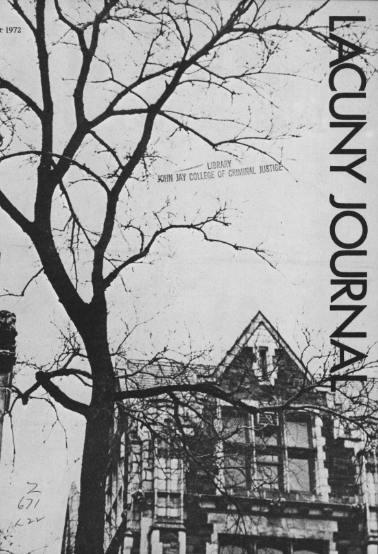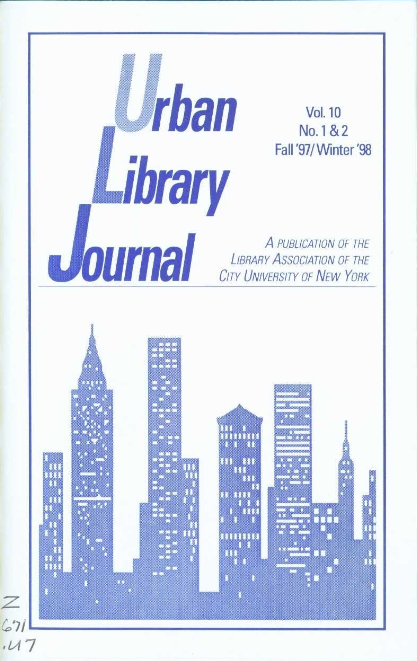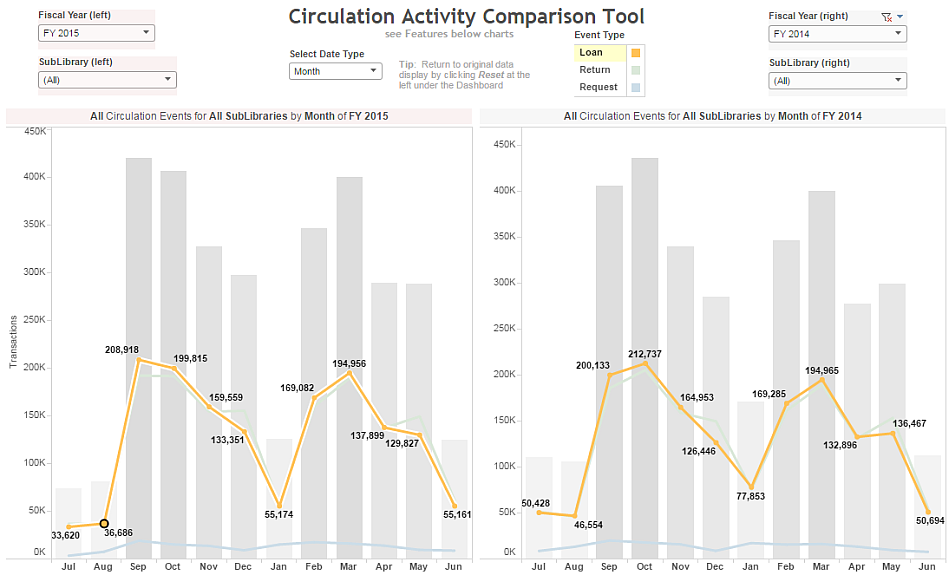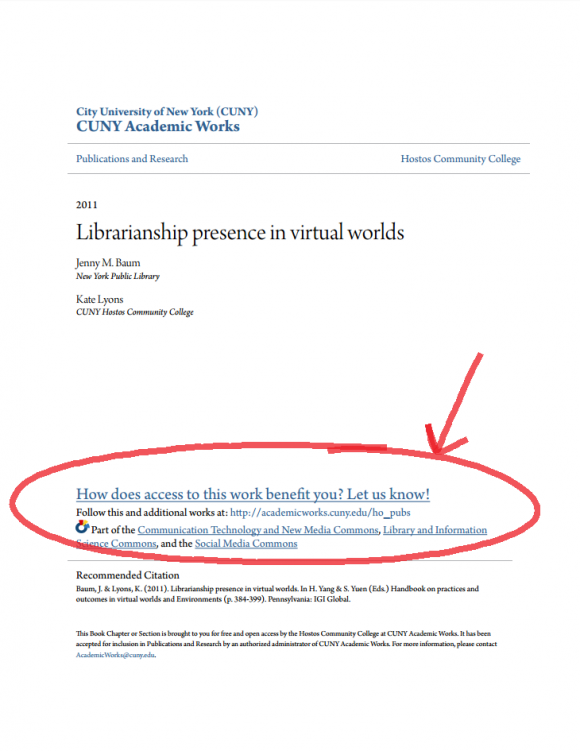Home » 2016 (Page 3)
Yearly Archives: 2016
Urban Library Journal launches in Digital Commons
The Office of Library Services is thrilled to announce the launch of Urban Library Journal on Academic Works’ Digital Commons platform. Published by the Library Association of the City University of New York (LACUNY), Urban Library Journal (ULJ) fills a gap in LIS scholarship by addressing the work of libraries and librarians in an urban setting.
Before it was Urban Library Journal
 In 1972, LACUNY launched its first journal, LACUNY Journal, as a means to make “the ideas of CUNY librarians known to each other and to colleagues in other departments of City University.” The Editorial Committee hoped to address a full range of subjects and perspectives – including controversial ones – in order to promote a free and open exchange of ideas and raise the professional goals of its membership. And it did just that. From profiles of CUNY libraries and librarians to articles about the relationship between libraries and open admissions to questioning the role ACRL plays in bringing libraries together, Volume 1, Issue 1 was a platform for the diverse voice, experiences, and perspectives present throughout CUNY Libraries.
In 1972, LACUNY launched its first journal, LACUNY Journal, as a means to make “the ideas of CUNY librarians known to each other and to colleagues in other departments of City University.” The Editorial Committee hoped to address a full range of subjects and perspectives – including controversial ones – in order to promote a free and open exchange of ideas and raise the professional goals of its membership. And it did just that. From profiles of CUNY libraries and librarians to articles about the relationship between libraries and open admissions to questioning the role ACRL plays in bringing libraries together, Volume 1, Issue 1 was a platform for the diverse voice, experiences, and perspectives present throughout CUNY Libraries.
In 1981, the LACUNY Journal was replaced by the Urban Academic Librarian, which expanded its scope and the conversation beyond CUNY, to librarians working in an urban academic setting. Michael O’Donnell, Chairperson of the LACUNY publications committee and a librarian at the College of Staten Island, introduced the first issue of this new publication with a call for change:
As the 1980s unfolded, urban academic librarians need to redefine their mission in order to achieve a balance between the academically desirable and the fiscally and physically feasible. By rejecting both the starry-eyed idealism of the Sixties and the “looking-out-for-number-one” cynicism of the Seventies, perhaps we can establish realistic and achievable goals. We hope this journal will help provide a free exchange of ideas.
Launch of Urban Library Journal
I n changing the name to Urban Library Journal in 1998, the members of the LACUNY publications committee opened the journal to all librarians working in an urban environment. The city, its institutions, and its people were under attack from politicians, their policies and their budgets. Editor Rolando Perez introduced the first issue under the journal’s new name by addressing the importance of its expanded scope:
n changing the name to Urban Library Journal in 1998, the members of the LACUNY publications committee opened the journal to all librarians working in an urban environment. The city, its institutions, and its people were under attack from politicians, their policies and their budgets. Editor Rolando Perez introduced the first issue under the journal’s new name by addressing the importance of its expanded scope:
“No true American lives in New York City,” commented Ronald Reagan while in office — a comment that though easily dismissed did set the tone for a certain attitude towards our cities. . .
This attitude, though somewhat tempered in the 90s, still domineers a lot of federal, state, and even local politics with respect to our cities. And though no politician today would make the same statement made by Reagan almost twenty years ago, a lot of the legislation that impact upon our cities, does reflect the unstated attitude of our politicians. It is reflected in the way our public education institutions have come under rhetorical and economic attack, it is reflected in the lack of funding for educational programs, and it is reflected in our elected officials’ attitudes towards the very institutions that support the cities, as for instance, our urban libraries.
As former co-editors Beth Evans and Sally Bowdoin note “shortly after the name change [to ULJ] the LACUNY publications committee began to recruit editorial board members outside of CUNY. In 2003, an advisory board of nationally recognized librarians, including E. J. Josey, University of Pittsburgh, James C. Welbourne, Enoch Pratt Free Library, and Neerejana Ghosh, New York School Library System, was established.”
ULJ became an online-only, open access publication in 2007 when it moved to the Public Knowledge Project’s Open Journal System. With this change, all urban librarians could not only submit to the journal, they could read it as well.
Urban Library Journal in Digital Commons

In moving to the Digital Commons platform, ULJ joins the larger Academic Works initiative at CUNY, or, to be more accurate, CUNY joins ULJ in the larger open access movement. It also marks the first journal to be published and supported by the Office of Library Services, a service we hope to grow in future years.
Under the leadership of editor Junior Tidal (City Tech), and with the deft support of web manager Valerie Forrestal (College of Staten Island), archived issues of ULJ dating back to 2007 have migrated to the new platform. As part of this process, Tidal and a LACUNY subcommittee comprised of Margaret Bausman (Hunter College), Mark Eaton (Kingsborough Community College), Charles Keyes (LaGuardia Community College), and Jessica Wagner (Baruch College) selected a new logo as part of a design contest hosted by Logosauce.com.
In addition to the visual redesign, ULJ worked with the Office of Library Services to make its policies and procedures more transparent to its readers and contributors. ULJ and the Office of Library Services thank the Journal of Librarianship and Scholarly Communication and its editors for providing permission to adapt its documentation.
The Office of Library Services is pleased to support Urban Library Journal as it moves forward, on its new home on Digital Commons.
Analytics: Circulation Activity Comparison Tool
In January, we introduced you to a CUNY OLS dashboard showing usage of our main library systems. That dashboard continues to be updated each month and we recently improved it, giving it in a new look and providing more school-specific detail.
Now we have a fun new offering: the Circulation Activity Comparison Tool!

Features
- Select Date Type to change the view from monthly to display by weekdays or by hours
- Click on a single Event Type to view only one type of circulation event: Loans, Returns, or Requests
- The title of each chart will change automatically to display the current selections for that chart
- Remove all filter selections by clicking Reset at the left under the charts
- Remove your last filter selection by clicking Undo in the same location
- Includes data from Fiscal Years 2014, 2015, and 2016 (through March 2016)
- Filter by a single SubLibrary or an entire Library (select all relevant SubLibraries in the drop-down selection box)
- Click on the Loans line (or Returns or Requests) to display that line’s transaction counts (as we did in the above image)
- Fiscal Year and SubLibrary selections are applied to one chart only
- Select Date Type and other selections are applied to both charts
Using this tool, you can easily
- Check your library’s peak hours for loans, returns, and requests
- View your library’s traffic by day of the week
- Compare 2 Fiscal Years by selecting different years on the left and right
- Compare 2 Libraries (select all SubLibraries for one on the left and for another on the right)
- Compare 2 SubLibraries
- Mix and match
Acknowledgments
OLS is currently using Tableau Public’s free service to bring you this information. Check the Tableau Public Status page if you can’t access our OLS dashboards.
We owe a huge thank you to Jennifer Murray at SUNY Buffalo for sharing not only their Tableau dashboard but also the logic used to create it. This allowed us to build on the work they did and adapt it to our needs at CUNY. In that same spirit, the logic we used appears below.
Technical Details
The data source is the Aleph Z35 Events table.
The selected fields are: Time Stamp (includes date, hour), Date (formatted), SubLibrary, and Circulation Event Type (groups 1 or more related events together)
Circulation Event Type Criteria
- Loan: selected loan transactions
- Return: return transactions
- Requests: hold request transactions
Other Details
- Limit to certain transaction types
- Limit transaction dates to the 2 previous fiscal years plus the current fiscal year (July 2013-current date)
- The order-by option is not required and merely makes the output easily scannable
- The output is tab-delimited
SQL
set heading off
set pause off
set pagesize 0
set linesize 2900
set colsep |
select z35_time_stamp || chr(9) || substr( z35_event_date, 5, 2) || '/' ||
substr( z35_event_date, 7, 2) || '/' || substr( z35_event_date, 1, 4)
|| chr(9) || Z35_SUB_LIBRARY || chr(9) || ( CASE
WHEN z35_event_type IN ('50','56') THEN 'LOAN'
WHEN z35_event_type in ('61') THEN 'RETURN'
WHEN z35_event_type in ('71','72','73','74') THEN 'REQUEST'
END)
from xxx50.z35 -- where 'xxx' is your library prefix
where z35_event_type in ('50','56','61','71','72','73','74')
and z35_event_date > '20130630'
and z35_event_date < '20160401'
order by z35_time_stamp
;
exit
How To | Dynamic feedback links in Digital Commons documents
At the beginning of this year, we announced a new feature in our institutional repository: a feedback form. It’s used to gather input from users of the repository to understand how access to these works benefits them:

If you’re running a repository using bepress’s Digital Commons and want to implement this feature, read on!
(more…)
Popular OneSearch Searches: March 2016
The following is a list of the top OneSearch search term at each campus (and the CUNY-wide OneSearch instance) between 03/01/2016 and 03/31/2016, organized by the number of times the query had been searched at that library:
- “social media” (275)
- 50 essays (169)
- “thirty years war” (112)
- jane austin (103)
- phillips “urban social work” (86)
- “gun control” (84)
- room key (83)
- adhd / children / education (79)
- the irish holocaust (63)
- carolyn rovee-collier (61)
- social mobility / united states (57)
- factory workers (54)
- souls of black folk (43)
- soylent green (38)
- water (37)
- poverty / poor / accountant* (31)
- youth video games (26)
- college readiness (23)
- english only (18)
- asian american career development: a qualitative analysis (10)
- america dancing (7)
- “cambridge associates” (4)
(The slashes indicate that the keywords were entered into individual search boxes on the Advanced Search screen.)
When we performed the top search in that library’s instance of OneSearch, we found some interesting audiovisual material, including a lot of news coverage about the role of social media during natural disasters (such as Hurricane Sandy) and social revolutions (such as the Arab Spring).
If you haven’t explored all that OneSearch has to offer, what are you waiting for!?
How is the “Journal” filter in OneSearch populated?
When you click on the “Journal” facet after doing a search, it almost always displays about 20 journal titles. However, in a search with thousands of results, you are obviously retrieving many more journals than that. And it doesn’t look like it’s the top 20 journals, either, because some of the hits for the same title are quite low. So what’s going on?
Most facets are created dynamically from search results. The 200 top-ranked records in a search result are used to create the list of facet values which will display in the “Expand My Results” section. All hits in the search results for those values are counted and the number is displayed in parentheses to the right of the facet value. So, really, it is not the 20 most common journals in the result, it is (at least in theory) the 20 most relevant journals.
Furthermore, the “Journal” facet includes newspaper titles, too, since it’s really a category consisting of serials. The resource type “Newspaper Articles,” on the other hand, refers to just articles within newspapers and “Articles” refers to articles in journals and other periodicals. Material types depend on the way the content is cataloged, whether it is by local catalogers (in the CUNY Catalog and CUNY Academic Works) or by the vendor (in the Primo Central Index).

